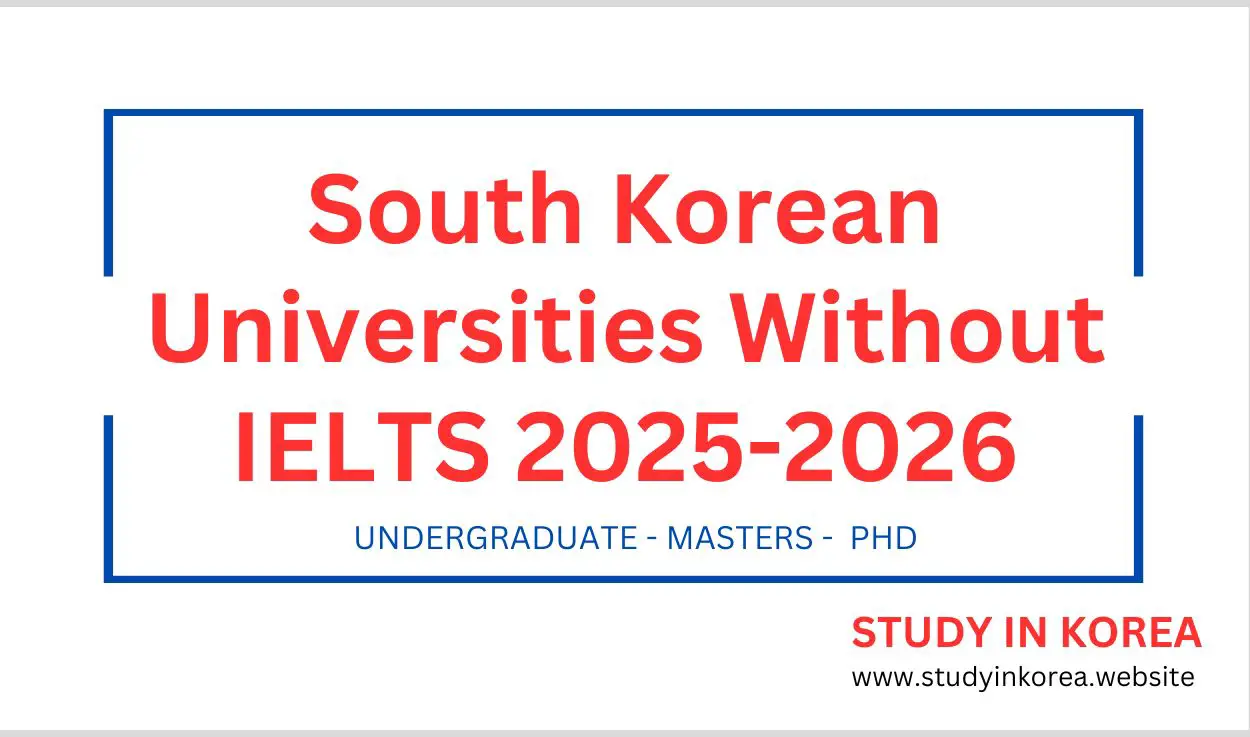
South Korean Universities Without IELTS 2025-2026
If your grades aren’t too high, don’t worry! There’s a good chance for you. South Korea Universities Without IELTS for the academic year 2025-2026, and the cool part is you don’t need to take the IELTS exam. But, many students don’t know how to get these scholarships. You can use them for your undergraduate / bachelor’s, master’s, or doctoral studies in South Korean universities. And it’s not just about studying – there are lots of job opportunities in South Korea after you finish. These international scholarships, whether from professors or the government, make it possible to study in Korea without dealing with the IELTS test. So, if you’re dreaming of Korea, a scholarship can make it happen!
Lots of international students, choose South Korea for their master’s and Ph.D. degrees. Why? Well, the application process is simple, and there are easy-to-get scholarships. Professors and universities also offer funding, making it even more accessible. The South Korean government is keen on bringing in 200,000 international students, and every year, around 2,000 students get scholarships from the government.
In this post, we’ll talk about Korean universities where you don’t need to take the IELTS, and we’ll also cover scholarships in South Korea that don’t require the IELTS. Check out the details below.
Host Country: South Korea
Host University: Best Universities of South Korea
Degree: Bachelor, Master’s, PHD
Financial Assistance: Yes There are also different scholarships program in these universities!
List of South Korea Universities Without IELTS 2025-2026
Explore the variety of South Korean universities that don’t require the IELTS exam. South Korea, with its mix of private and public institutions, is actively encouraging more international students to join its academic community.
#1 Seoul National University in Korea
This university is renowned for its research opportunities and academic excellence. Seoul University in South Korea holds the second position nationally and is ranked 33rd globally.
When it comes to language proficiency tests, you’re not limited to just the IELTS. You can alternatively provide your TOEFL scores or present an English Proficiency Certificate from your university. This certificate should confirm that English is the language of instruction throughout your studies.
#2 Sejong University in South Korea
Sejong University, a private institution, aspires to secure a position among the top 50 universities in Asia. The university is actively enhancing its curriculum and programs to better cater to the needs of international students.
To ensure the best for students, it is important to submit proficiency scores. Your university will provide you with an English Proficiency Certificate affirming that the language of instruction during your studies is English.
#3 Korea University
This university undeniably stands among the best globally. Additionally, they recognize an English Proficiency Certificate from your university, confirming that English is the language of instruction throughout your academic tenure there.
#4 Yonsei University South Korea
As the oldest university in South Korea, Yonsei University holds a position among the top three in the country. If you are a native English speaker or have completed studies in an English-based program, that will serve as sufficient proof.
#5 Hanil University South Korea
The architecture of Hanil University is incredibly stunning, making it impossible not to appreciate. Additionally, the university welcomes international students without requiring the IELTS exam. These students have the flexibility to choose from a diverse range of subjects.
#6 Postech University
Situated in Pohang, South Korea, Pohang University of Science and Technology (POSTECH) is a private research university focused on science and technology. Typically, POSTECH does not demand IELTS or TOEFL for admission.
#7 Gachon University
Gachon University stands as one of the most distinguished institutions in South Korea. The university warmly welcomes international students, even without the need for IELTS. Your university will issue an English Proficiency Certificate, confirming that English is the language of instruction throughout your studies.
Good Luck!
Share this content:





